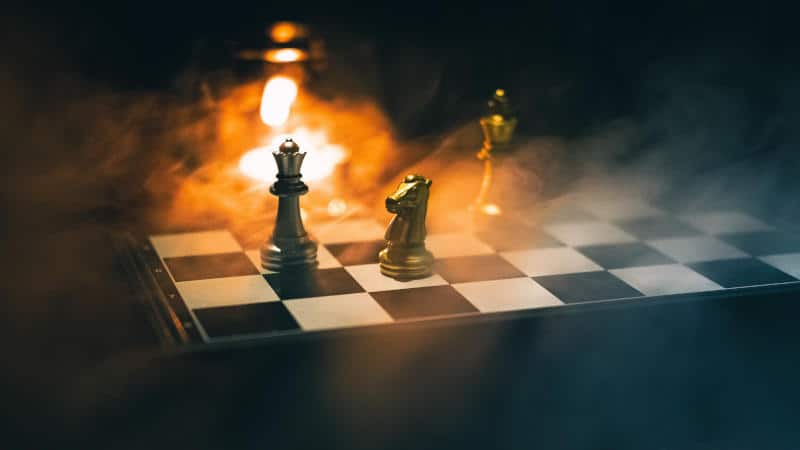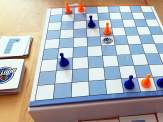I have previously looked at replayability in board games and I must admit, I still can’t put my finger on why a game like Chess, which has no variability and no randomness, is so hugely replayable and remains interesting even after dozens of plays, while other games with variable setup, different factions and a large amount of chance are sometimes boring after only a handful of plays. So let me grapple with this topic in yet another article.
Listen to the Audio Version
Intro Music: Bomber (Sting) by Riot (https://www.
Music by https://www.bensound.com/free-music-for-videos
License code: GFG9M5LABXJVAYHL
Music: https://www.bensound.com
License code: NEXSB878MEP7TSVY
General Orders
I was reminded of this topic after playing General Orders by Trevor Benjamin and David Thompson for the first time with a friend. It’s a wonderfully tightly designed game. It’s compact, not just in its physical form, but also in its gameplay. There is a lot of gameplay in only four rounds. Every decision counts. Every mistake matters. How the dice fall and what cards you play can have a huge and devastating impact.
Yet, it struck me that each side of the double-sided gameboard is actually very limited. The decision space to formulate your strategy in feels relatively small, maybe smaller than the box the game comes in. I started to wonder after how many times of playing General Orders you would settle on a handful of specific opening turn sequences. Surely, you would always first advance into one of the central hexes to take advantage of a specific area bonus token. Which hex would depend on how these tokens had been randomly distributed. Your opponent would then likely take a plan action to draw a certain number of cards. You would probably reinforce the troops you just advanced into the middle. And so on…
Of course, the actual sequence will vary from game to game, but overall there seems to be only a small number of openings. A certain action by one player requires a certain response from the opponent. The first few turns could become quite mechanical.
It’s only when it comes to what cards you draw and what dice results you roll that you have to start diverting from these standard openings. At that point, randomness will send you off on potentially very different paths that can’t really be planned for. Here is where tactics come in.
Standard Openings
I have to admit, I played General Orders only once. So these thoughts are only my first impressions. Yet, I can’t shake the thought that the game may become a bit repetitive and lose its interest after half a dozen games. That’s when you flip the game board over and play the airplane version, which will probably give you another half dozen games that are really interesting. Of course, I’m probably wrong and General Orders will remain interesting for much longer. After all, the randomness of the card draw and the dice rolls is going to create enough variability to keep you on the edge of your seat.
At the end of the day, this article isn’t a review of General Orders. I am not trying to pick on this game. I am really just trying to establish why I was so concerned about the replayability of it compared to Chess, for example. After all, Chess also has standard openings. They have all been very thoroughly studied and evaluated to a point where many professional Chess players try to move away from documented openings and take the game off the beaten track.
Of course, there are many more possible openings in Chess when compared to General Orders. However, that alone doesn’t seem to make for a game that’s going to remain interesting for longer. While it’s true that the longer list of openings will take longer to learn than the smaller options in General Orders, and while it’s also true that Chess rules are harder to grasp than those of General Orders, it’s not true that they are the reasons why Chess feels like a game that will keep players’ interest for longer.

Decision Space
However, where the two games dramatically differ is the overall decision space. Like many abstract strategy games of its ilk, the number of possible game states is huge in Chess. It is estimated there are around 10 to the power of 40 possible positions in Chess. I reckon that number is a lot smaller in General Orders, by a few orders of magnitude at least. So even once you exhaust the highly analyzed openings in Chess, you’re still left with a huge amount of possible options and a similarly large, but smaller, amount of difficult decisions to make.
Not only that, you’re always trying to look a few steps ahead. Once you’ve left the beaten track and entered the wild, open game space of Chess, you have to make up your own mind about what the opponent will do in response to your move, what you will do in reply to theirs, what they will do in return and so on, up to as many turns ahead as you possibly can. In Chess, that’s a huge decision tree you need to cover.
I have the feeling that in General Orders that decision tree is a lot smaller. It seems that it’s a lot easier to try and predict what your opponent will do after you’ve made a certain move. It’s also then easier to work out what you will do in response. I reckon you can predict the next four turns or so relatively easily, at least more easily as you can in Chess.
I think that’s why I had the impression that General Orders is probably going to lose its interest after a handful of plays. Maybe not half a dozen, like I said earlier, but still a lot sooner than I would lose interest in Chess.
Unfair Comparison
Then I started to realize that I am making an unfair comparison. General Orders is not like Chess. They’re both two-player abstract strategy games, for sure. However, while one is designed to create an exciting experience with low rules overhead in a short space of time, the other is intentionally trying to be more complex and emulate a more intricate and involved real-life experience.
So while Chess is definitely going to keep my interest for a long time to come, after having been a popular game for me since my teenage years, General Orders will keep my interest for a long time too, but for a different reason.
Chess is completely predictable. In theory, you could map every turn and counter-turn. There is no randomness. The only randomness comes from the players and the choices they make. It’s a perfect information game.
General Orders intentionally has a small decision space, but has also intentionally introduced randomness into the game. That’s what its strength is. It’s an imperfect information game.
The sooner you can get away from any sort of standard openings in General Orders and lean into the element of chance this game offers, the more exciting the game experience will be. The interest doesn’t come from the sheer amount of possible game states, but the unpredictability of dice rolls and card draws. It comes from the bluffing of players who pretend that they have the perfect card to counter the opponent’s attacks. Looking the person on the other side of the table in the eyes and luring them into a trap is what is exciting and keeps players invested.
Different Types of Interest
It now makes sense to me why I was a bit concerned about the longevity of General Orders for me. I saw it as a game where you can perfectly plan out your strategy. However, the game is equal parts about tempting luck, bluffing, strategy and tactics. It’s not Chess and that’s why it’s impossible to properly compare the two games.
As I said, I do need to play General Orders a lot more to properly formulate my opinion of the game. In the meantime though I know that I need to look at this game as not yet another perfect information abstract strategy game. It’s different. It’s actually more than that. Player interaction in this game doesn’t just happen on the table. It also happens above the table. It’s the interaction between two people playing this game.
So, yes, I can’t wait to pay it more often.
How About You?
Now I wonder what you think. Have you ever thought that some abstract strategy games are a bit limited? Have you ever played one of these types of games and found you lost interest in it quite quickly? Is there an abstract strategy game that has kept your interest for a very long time over many, many plays? As always, please share your thoughts and experiences in the comments below. I’d love to hear what games have kept you coming back for more.
If you enjoyed this article, please have a look at my support page to see how you can help keep the blog going.
Useful Links
Audio Version
Intro Music: Bomber (Sting) by Riot (https://www.
Music by https://www.bensound.com/free-music-for-videos
License code: GFG9M5LABXJVAYHL
Music: https://www.bensound.com
License code: NEXSB878MEP7TSVY
Playlist
These are the songs I listened to while I was writing this topic discussion article:






